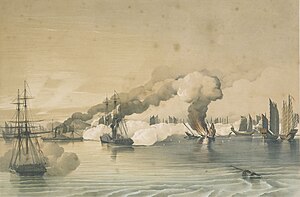Battle of Tonkin River
| Battle of Tonkin River | |||||||
|---|---|---|---|---|---|---|---|
| Part of Piracy in Asia | |||||||
 Destruction of Shap Ng tsai's fleet |
|||||||
|
|||||||
| Belligerents | |||||||
|
|
|
||||||
| Commanders and leaders | |||||||
|
|
|
||||||
| Strength | |||||||
|
Land: unknown land forces Sea: 2 sloops-of-war 1 brig 8 war-junks |
Land: ~1,400 pirates Sea: 64 war-junks |
||||||
| Casualties and losses | |||||||
|
British: none 2 sloops-of-war damaged 1 brig damaged Chinese: unknown Vietnamese: unknown |
~2,400 killed or wounded ~300 captured 58 junks sunk |
||||||
The Battle of Tonkin River was a major naval battle fought in northern Vietnam between the pirates of Shap Ng-tsai and the British Royal Navy with aid from the Qing Chinese navy and the Tonkinese. The 1849 expedition led to the destruction of Shap Ng-tsai's fleet and the loss of over 2,000 men. The battle occurred over a three-day period at the mouth of the Tonkin River, near present-day Hai Phong.
In 1810 the government of the Qing Dynasty issued a pardon to all pirates operating in China, thousands accepted and joined the Qing navy which began the decline of piracy in the Far East. However, though many pirates chose to give up their criminal ways, thousands continued pirating along the southern Chinese coast. The pirates used war-junks and occasionally other vessels as well. Several different pirate groups were active in this time and they usually operated in mass against merchant vessels. By 1847 the Royal Navy began to take more serious measures against the pirates. They had already engaged the Chinese brigands in combat as early as 1839 and it took until the late 1860s to finally put an end to fleets of pirate junks but even then piracy continued in China but was done so in a different way as new steam vessels meant a change in tactics.
Shap Ng-tsai was one Chinese pirate commander who attacked merchant ships in the mid 19th century. He commanded a fleet of around seventy junks working out of Tienpak. They varied in size and later the British commander of the battle, John Charles Dalrymple Hay, divided them into classes. Of the sixty-four he encountered at Tonkin River, the single largest junk carried forty-two guns of different poundage with a crew of 140. The second class of which there were sixteen of mounted twenty-eight to thirty-four guns and had crews of seventy-five men. The third class was smaller with twelve to nineteen guns and forty man crews, Hay counted forty-two of these vessels. There was five junks of the fourth class which were armed with six guns and had a complement of thirty pirates each. Most of the guns were reportedly long 18-pounders which were used regularly by Chinese pirates at the time. In total Commander Hay estimated that his squadron faced 1,224 enemy guns and 3,190 pirates including their leader Shap Ng-tsai who captained the junk of the first class and used her as his flagship.
...
Wikipedia
